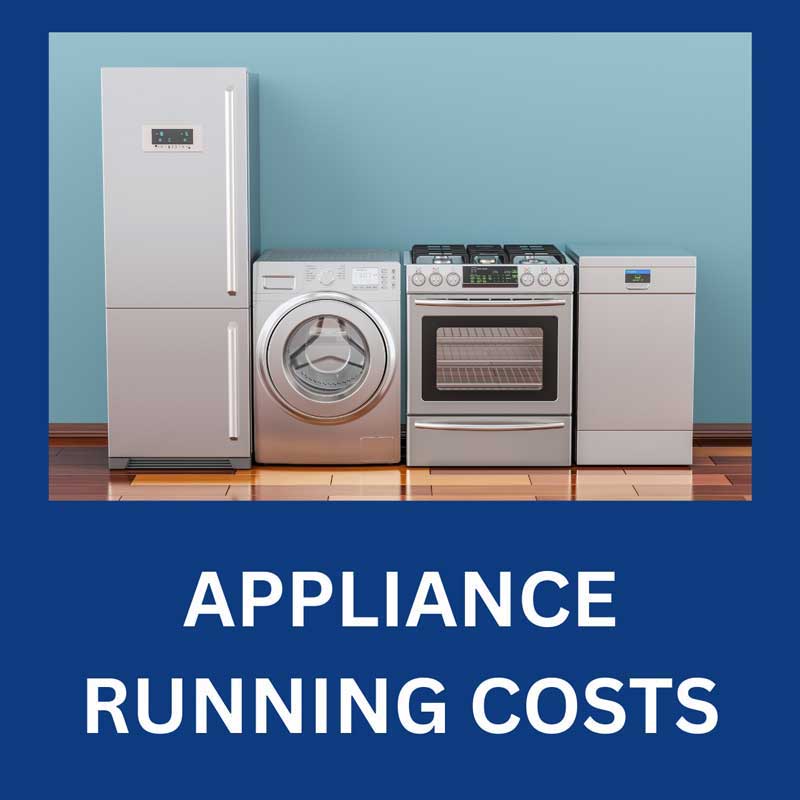
Appliance running costs 2026: From 1 January to 31 March 2026, the UK energy price cap is £1,758 a year for a typical dual-fuel household, an increase of about £3 per year (around 25p per month).
Electricity now costs 27.69p per kWh with a daily standing charge of 54.75p, while gas costs 5.93p per kWh with a daily charge of 35.09p.
Find out how much your appliance running costs will rise under the new rates.
Introduction
Managing household expenses involves understanding the costs of running household appliances.
This guide provides a full summary of appliance running costs in the UK based on the energy price cap effective from 1 January to 31 March 2026.
But before we dive into appliance costs, there’s one factor that shapes everything: the Energy Price Cap…
The Energy Price Cap
The energy price cap limits the maximum annual amount energy companies can charge customers on standard variable and default energy tariffs for a medium-usage household.
Set by Ofgem, the UK energy regulator, the cap is reviewed quarterly.
From 1 January to 31 March 2026, the energy price cap for a typical UK household using electricity and gas is £1,758 per year.
This is an increase of around 0.2%, adding £3 per year, or around 25p per month, to the average household bill.
For customers on a standard variable tariff paying by Direct Debit, the average cost of electricity is now 27.69p per kWh, with a daily standing charge of 54.75p.
Gas customers will pay an average of 5.93p per kWh, with a daily standing charge of 35.09p. These figures reflect the average rates across England, Scotland, and Wales, including VAT.
Now, here’s where it gets interesting—how these rates actually affect what you pay to run everyday appliances…
Understanding Appliance Running Costs
Several factors affect appliance running costs:
- Energy Costs: The cost of electricity or gas determines running expenses.
- Energy Efficiency: Appliances with higher energy ratings consume less electricity or gas for the same output as lower-rated ones.
- Usage Patterns: The frequency and duration of appliance use impact running costs. These patterns vary by household.
The True Cost of Running Your Appliances From October 2026
| Appliance | Daily Cost (£) | Weekly Cost (£) | Monthly Cost (£) | Yearly Cost (£) |
|---|---|---|---|---|
| Fridge Freezer | £0.34 | £2.36 | £10.29 | £123.40 |
| Oven (electric) | £0.24 | £1.65 | £7.17 | £86.00 |
| Oven (gas) | £0.06 | £0.41 | £1.81 | £21.70 |
| Dishwasher | £0.32 | £2.15 | £9.35 | £112.20 |
| Microwave | £0.04 | £0.29 | £1.25 | £14.95 |
| Kettle | £0.05 | £0.36 | £1.54 | £18.71 |
| Washing Machine | £0.24 | £1.65 | £7.17 | £86.00 |
| Tumble Dryer | £0.32 | £2.15 | £9.35 | £112.20 |
| Dehumidifier | £0.13 | £0.90 | £3.87 | £46.40 |
| Fan | £0.03 | £0.22 | £0.88 | £10.76 |
| Gas Boiler | £1.19 | £8.33 | £36.25 | £434.40 |
But unit rates aren’t the whole story—standing charges also play a big role in your overall bill…
How Standing Charges Affect Your Energy Bill
Alongside the unit rates for gas and electricity, every household pays a fixed daily standing charge.
This fee covers the cost of maintaining the energy network and keeping your home connected, regardless of how much energy you use.
Under the January–March 2026 price cap, the standing charge is just under £330 per year for an average dual-fuel household.
(based on combined daily standing charges of 89.84p per day across gas and electricity.)
This means even if you use very little energy, you will still face these baseline costs.
| Fuel Type | Daily Standing Charge (£) | Monthly Cost (£) | Yearly Cost (£) |
|---|---|---|---|
| Electricity | 0.55 | 16.65 | 199.84 |
| Gas | 0.35 | 10.68 | 128.10 |
| Dual Fuel (Electricity + Gas) | 0.90 | 27.33 | 327.94 |
So if you can’t escape the standing charge, where can you save? The answer lies in how you use your appliances…
Strategies For Reducing Appliance Running Costs
Investing in energy-efficient appliances is one strategy to reduce running costs, but it’s not the only one.
For instance, an A+++ fridge saves around £23 per year compared to a similar A+ model. Similarly, an A+++ washing machine saves about £18 per year compared to an A+ model.
Regular maintenance and cleaning also help extend the life of your appliances and keep them at peak performance, reducing the energy they consume.
Moreover, smart technologies and home automation systems reduce energy costs.
These technologies set appliances to run during off-peak hours when electricity is cheaper or to turn them off when not in use.
Consider the following energy-saving tips and practices…
Fridge Freezers
- Ensure the fridge-freezer is not placed near a heat source, such as an oven or radiator, and that there is enough space for air to circulate around it.
- Keep the fridge and freezer full to reduce the energy needed to cool the space.
- Defrost your freezer on a set schedule to keep it running at peak performance.
Ovens (Electric and Gas)
- Only preheat when necessary and for the shortest time possible.
- Use leftover heat for the last few minutes of baking.
- Keep the oven door closed as much as possible to prevent heat loss.
Dishwashers
- Run the dishwasher only when full.
- If available, use an eco mode or an energy-saving setting.
- Air-dry dishes instead of using the drying function.
Microwaves
- Use the microwave for small and quick heating tasks instead of the oven or stove, as it uses less energy.
- Defrost food in the fridge instead of using the microwave’s defrost function.
Kettles
- Only boil as much water as needed.
- Descalcify your kettle regularly.
Washing Machines
- Wash clothes at lower temperatures.
- Only run the machine with full loads.
- Use eco-mode or energy-saving settings if available.
Tumble Dryers
- Dry clothes naturally when possible.
- Spin-dry clothes well before putting them in the tumble dryer to reduce drying time.
- Clean the filter often to maintain peak performance.
Dehumidifiers
- Only use when necessary.
- Keep windows and doors closed when the dehumidifier is running.
Fans
- Use fans instead of air conditioning units where possible.
- Only use when in the room – fans cool people, not spaces.
Gas Boilers
- Service your Boiler to maximise performance.
- If your Boiler’s over 10 years old, consider replacing it.
- Insulate your home well to reduce heating costs.
- Install a programmable thermostat to control when the heating comes on and goes off.
- Remember, while using appliances efficiently reduces your energy consumption, the most efficient appliance is the one that’s off. So, always turn off appliances when they are not in use.
No matter how efficient your habits are, some appliances simply cost more to run than others.
That’s where energy ratings come in…
Energy Ratings & Purchasing New Appliances
When purchasing energy-efficient appliances, several factors should be considered to make the best decision. Here are some tips:
Understand Energy Efficiency Labels
Look at the energy efficiency labels on the appliances. These labels show how much energy the appliance will use, shaping how much it will cost to run.
Appliance energy ratings are labels that provide information about an appliance’s energy efficiency.
These ratings are represented on a scale, with different levels indicating different levels of energy efficiency.
In the UK, energy efficiency ratings ranged from A+++ (most efficient) to D (least efficient).
However, to reduce confusion due to the multiple ‘+’ signs and to leave room for newer, more efficient models, a new scale from A to G was introduced in March 2021. A is the most efficient, and G is the least efficient.
The energy label also includes additional information, such as:
- Energy consumption: Measured in kilowatt-hours (kWh) per year, this shows how much energy the appliance uses.
- Volume: For fridges and freezers, this shows the internal capacity.
- Noise: Measured in decibels (dB), this shows how much noise the appliance generates.
- Water consumption: This shows how much water the appliance uses per cycle for washing machines and dishwashers.
Purchasing appliances with better energy ratings (closer to ‘A’) saves you money on your energy bills and reduces your carbon footprint.
Always consider an appliance’s energy efficiency when making a purchase decision, even if more efficient models are more expensive upfront.
Over the appliance’s lifetime, the energy savings often outweigh the higher initial cost.
Choose the Right Size
Buy appliances which fit your needs. Larger appliances usually consume more energy. For example, if you’re a small family, you don’t need a massive fridge-freezer, and a smaller, more efficient model serves you just as well.
Consider the Total Cost
Consider the total cost of owning the appliance, not just the purchase price. This total cost includes the purchase price and the operating costs of the appliance throughout its lifetime. An appliance with a higher purchase price but lower running costs is often cheaper in the long run.
Look at the Features
Some appliance features lead to increased energy use. Consider whether you need these features and whether you will use them. If not, choosing a simpler model saves energy.
Look for Variable Settings
Look for appliances with variable settings, such as a fridge which allows you to set different temperatures for different compartments or a washing machine with eco-modes. This lets you change the energy use based on your actual needs.
Read Reviews
Before buying, read reviews from other customers. They often share real-world experiences about the appliance’s performance and energy consumption.
Remember, the most energy-efficient appliance is the one which best meets your needs while using the least amount of energy.
Always take the time to compare different models and choose the one which fits your lifestyle and budget while saving the most energy.
So, what’s the bottom line after all these numbers?
Turn Knowledge Into Lower Energy Bills
We hope this guide has given you a clear picture of what your appliances really cost under the new energy price cap.
When you understand those running costs, you’re in control. You can make smarter buying choices, cut waste, and take charge of your energy use.
Energy efficiency isn’t just a buzzword — it’s the key to shrinking your bills. Choosing efficient appliances, using smart tech, and building energy-saving habits all add up.
So take a closer look at how much power your appliances are using.
Knowledge isn’t just power. In this case, it’s less power — and more money left in your pocket.

Hi, I’m Terry, the founder and owner of TM Hughes & Son Gas Services
Please get in touch to book an appointment or receive a free, no-obligation quote
Call – 01245 830075
Email – info@tmhughesandson.uk
0% Finance
For Boiler Installations & Repair
